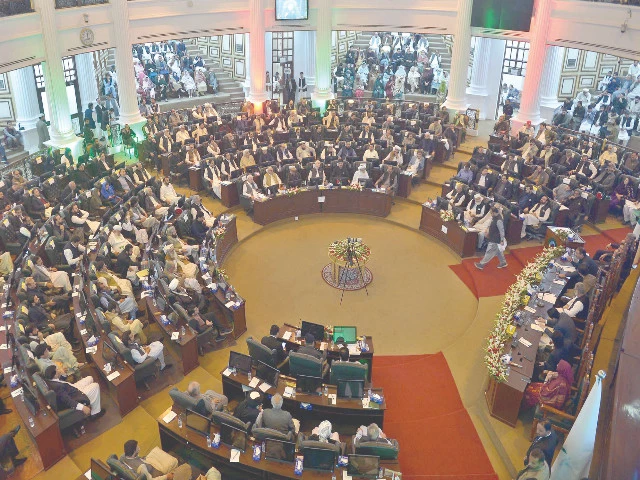Delegates attend a peace jirga called by the Khyber-Pakhtunkhwa government at the provincial assembly in Peshawar. Photo: PPI
PESHAWAR:
Khyber Pakhtunkhwa’s political and civic leadership on Wednesday urged a united, politics-free approach to tackling terrorism and securing the province’s constitutional and fiscal rights, as a multi-party peace jirga met in Peshawar to chart a common strategy.
In a rare show of unity, leaders from across the political spectrum called for an inclusive and permanent counterterrorism policy that transcends party lines and prioritizes the safety and rights of the province.
The peace jirga strongly condemned terrorism and called for a comprehensive strategy to restore peace in the province.
In a joint statement, the jirga urged the KP government to trust the provincial assembly on anti-terrorism measures and assign internal and security responsibilities to the police and the Anti-Terrorism Department.
The jirga also recommended removing unnecessary security checkpoints and curbing illegal transportation of minerals from the province and other conflict-affected areas.
He further called for reopening trade routes between Pakistan and Afghanistan, formulating Pakistan-Afghanistan foreign policy in consultation with the KP government and drafting a new National Action Plan (NAP) in coordination with the provincial government and assembly.
Speaking at the provincial assembly jirga, Chief Minister Suhail Khan Afridi said the cost of two decades of militancy can be counted in lives and sacrifices, adding that the time has come to overcome partisan differences and adopt a single long-term policy.
He urged the federal government to adopt a new approach to fighting terrorism that involves all stakeholders in decision-making. “I hope that a lasting and permanent solution is found to this menace of terrorism, which has been devouring Khyber Pakhtunkhwa for more than 20 years,” he said.
Afridi stressed that the era of “decisions behind closed doors” must end. “We must leave closed spaces, consider others intelligent and consider politicians wise.”
He warned against short-term solutions, insisting on a “once and for all” policy to eradicate terrorism from the province.
Afridi warned that bombs do not control voters’ cards and stressed that sustainable peace will only be possible after the elimination of terrorism.
He appealed to all political parties to unite for the rights of the province, saying that KP’s share under the NFC amounts to Rs 6.14 billion and after including the newly merged tribal districts, a share of 19 per cent.
However, he regretted that the province is not receiving what it deserves. Afridi added that NFC’s share amounts to Rs 400 billion and argued that the federal government owes KP Rs 200 billion in net profits from Hydel.
He protested the “stepmotherly” treatment of the province, adding that short-term solutions must give way to a “once and for all” policy.
Regarding Afghanistan, Afridi welcomed the talks and urged that war remain a last resort, noting that Pakistan and Afghanistan share many values and that a peaceful Afghanistan was essential for regional connectivity, peace and prosperity.
Governor Faisal Karim Kundi, also addressing the jirga and sitting next to the prime minister, endorsed the call for collective action.
“If we don’t sit together, no solution will emerge,” he said.
He congratulated the speaker for bringing all stakeholders under one roof and urged him to form a multi-party committee to ensure that the jirga’s recommendations continue to be implemented.
Kundi stressed that the future of the province should take priority over political rivalries. “Every few years, a superpower comes and tries to conquer Afghanistan, and when it leaves after failing, it leaves its filth behind in the form of weapons, which are used against us,” he said.
He warned that the terroirsts were now equipped with advanced weapons, such as thermal sniper rifles, adding that the province lacked the capacity to counter them on its own. “We must put aside our politics and think about the prosperity of our province,” he urged.
Kundi urged provincial, federal and security institutions to come together to find lasting solutions and recommended forming a committee with a representative from each party to take forward the province’s case.
He stressed the need to channel the youth in the right direction and said the provincial government would support efforts to secure KP’s rightful share.
Former National Assembly Speaker Asad Qaiser echoed Afridi’s call for unity and diplomacy and said Pakistan must engage in Kabul through dialogue.
“Pakistan and Afghanistan cannot survive without each other,” he said. “There will be peace in Pakistan once there is peace in Afghanistan.”
PML-N’s Ibadullah Khan, leader of the opposition in the KP Assembly, noted that the jirga was being held in the provincial legislature for the first time. “We have put aside a host of differences and sat down with the PTI,” he said, calling terrorism the province’s “number one issue.”
Meanwhile, the ANP’s Mian Iftikhar Hussain rejected any distinction between “good” and “bad” Taliban, adding that only a full implementation of the National Action Plan could restore peace.
“The government must take charge of this problem,” he said. “The ANP bravely confronted the militancy. We spoke, we fought and we rehabilitated the displaced.”
Former Prime Minister Mehmood Khan, who now heads the PTI MPs, questioned the fate of past peace jirgas. “You are the government. The people gave you the mandate. You must sit down with key stakeholders and form a jirga to talk to the federal government,” he said.
Other attendees included JI leaders Sirajul Haq Professor Mohammad Ibrahim, PPP’s Akhunzada Chattan, JUI-F senators Maulana Attaur Rehman and Maulana Attaul Haq Dervesh, and representatives of the Pakhtunkhwa Milli Awami Party and Pakistan’s Mazdoor Kisan Party.
The jirga began with prayers for victims of terrorism across the province.




